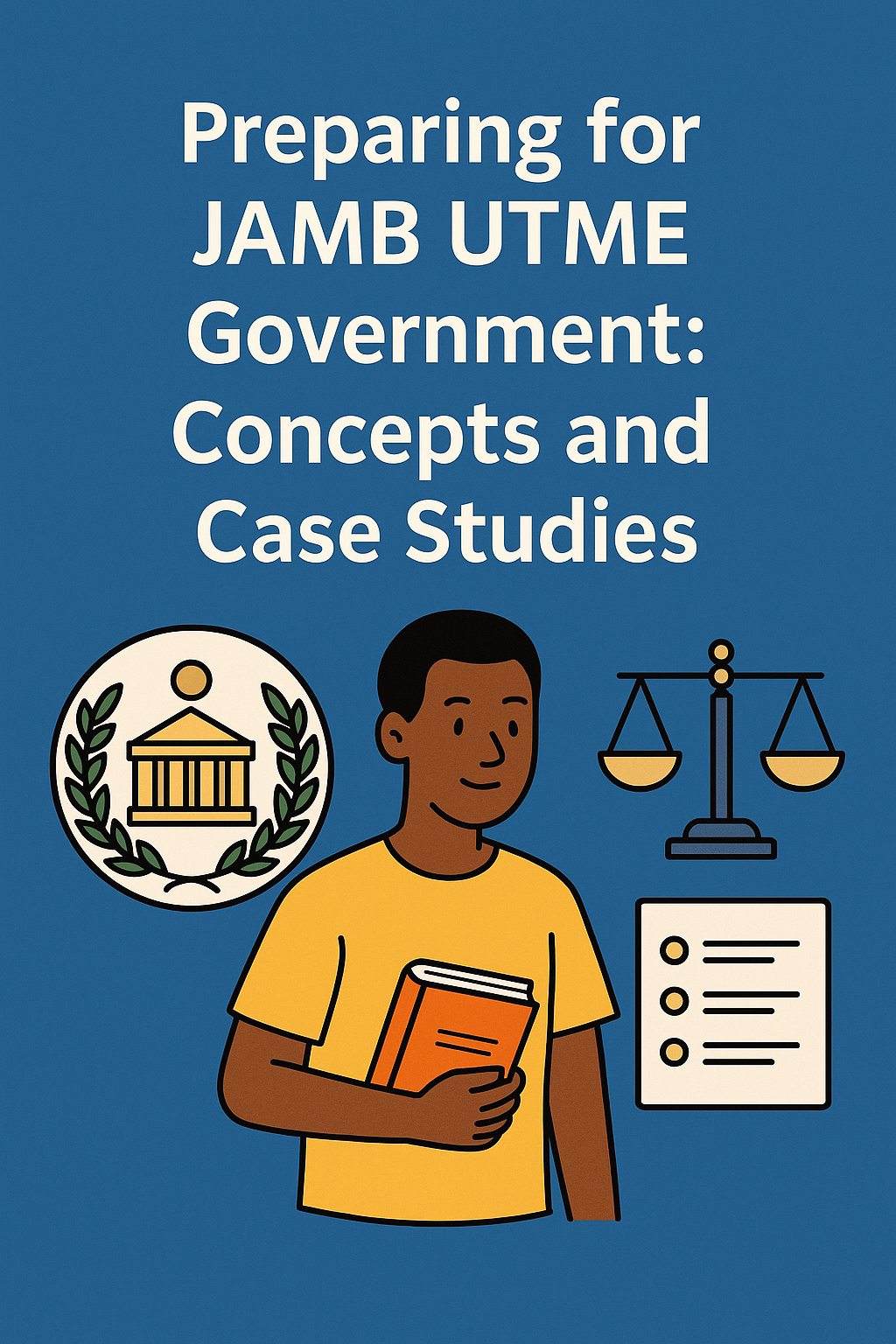1. Introduction
Government as a UTME subject tests your grasp of political theory, civic structures, and current affairs. Excelling in Government boosts your aggregate and enhances critical thinking skills crucial for social sciences and humanities. This guide explores the syllabus, question formats, and high‑yield study methods to secure top marks.
We’ll examine key concepts political ideologies, governance models, public policy while integrating case studies and current affairs where relevant. You’ll learn essay strategies for case‑based questions, tips for multiple‑choice precision, and methods to link theory with practical examples.
By bridging conceptual knowledge with real‑world contexts, you’ll approach JAMB Government questions with clarity and analytical depth. Let’s navigate governance structures and debates together.
2. Deep Dive: Core Topics & Concept Breakdown
2.1 Political Theories and Ideologies
- Liberalism vs Conservatism: Origins, key thinkers, modern applications
- Socialism & Marxism: Class struggle, means of production, comparative critiques
- Democracy Variants: Direct, representative, participatory models
Case Study
Analyze Ghana’s transition to multiparty democracy, focusing on structural adjustments and civic engagement.
2.2 Nigerian Government Structure
- Constitutional Framework: 1999 Constitution key features, separation of powers
- Branches of Government: Legislative, executive, judiciary roles and checks
- Federalism: State vs federal powers, revenue allocation formula, local government autonomy
Problem Drill
List three exclusive and three concurrent legislative powers under the constitution.
2.3 Political Processes and Public Policy
- Elections and Voting Systems: First‑past‑the‑post vs proportional representation
- Party Systems: Single‑party, two‑party, multiparty dynamics
- Public Policy Cycle: Agenda setting, formulation, implementation, evaluation
Policy Analysis
Evaluate the impact of fuel subsidy removal on the Nigerian economy and social stability.
2.4 International Relations
- Key Concepts: Sovereignty, diplomacy, international law
- Global Bodies: UN, AU, ECOWAS roles and functions
- Current Affairs: Recent treaties, peacekeeping missions, trade agreements
Data Interpretation
Interpret a chart showing Nigeria’s trade balance over the past five years.
3. Exam Strategy Tips
3.1 Time Allocation & Question Order
- Spend 45 minutes on MCQs, 20 minutes on short answers, and 25 minutes on essay questions.
- Prioritize questions with direct answers in the constitution or recent events.
3.2 Answering MCQs Precisely
- Use elimination: cross out options that contradict constitutional provisions.
- Fact‑check with key dates and names memorized in flashcards.
3.3 Short‑Answer Techniques
- Be concise: 2–3 sentences per question; use civic terminology accurately.
- Bullet points are acceptable when clarity is needed.
3.4 Essay Writing for Case Studies
- Structure: Introduction (thesis + context), body (analysis + examples), conclusion (summary + implication).
- Integrate data: reference statistics or historical outcomes to strengthen arguments.
3.5 Managing Political Content Under Pressure
- Avoid bias: present balanced views; acknowledge counterarguments.
- Keep definitions crisp: start essays by defining key terms.
4. Subject‑Specific Overview
4.1 Constitutional Insights
Memorize landmark sections: fundamental rights (Chapter IV), electoral guidelines (sections 130–138).
4.2 Governance Models
Compare federal and unitary systems: autonomy, efficiency, representation.
4.3 Policy Case Studies
Deep‑dive examples: education reform, health policy responses during COVID‑19.
4.4 Global Affairs Context
Link regional blocs to Nigeria’s economic strategies; discuss ECOWAS conflict interventions.
5. Practice & Resources
5.1 Essential Texts
- JAMB Past Questions: Government (Alpha Press)
- Understanding Nigerian Government by Ike Ubani
5.2 Online Platforms
| Resource | Features | Access |
|---|---|---|
| Nigeria Law Blog | Constitutional analysis articles | Free |
| BBC Pidgin | Simplified current affairs coverage | Free |
| Coursera | Civic education, policy analysis | Free/Paid |
5.3 Mobile Apps
- Civics Flashcards: Key terms and dates.
- JAMB CBT Prep: Government practice sets.
5.4 Mock Exam Strategy
- Weekly timed MCQ quizzes.
- Monthly essay writing under timed conditions; peer review for feedback.
6. Conclusion
Preparing for JAMB UTME Government requires both mastery of political theory and fluency in current affairs. By understanding ideologies, constitutional structures, policy cycles, and international relations and applying them through case studies and precise writing you’ll tackle the Government paper with depth and accuracy.
Adopt a balanced study routine: review theory notes, analyze news articles, write practice essays, and engage in quiz drills. Monitor your progress through mock exams and adjust focus areas accordingly. With discipline and the strategies outlined here, achieving a high score in JAMB Government is fully attainable.
Begin now: pick one constitutional provision and explore its real‑world application in a recent event. Your path to Government excellence starts today.
